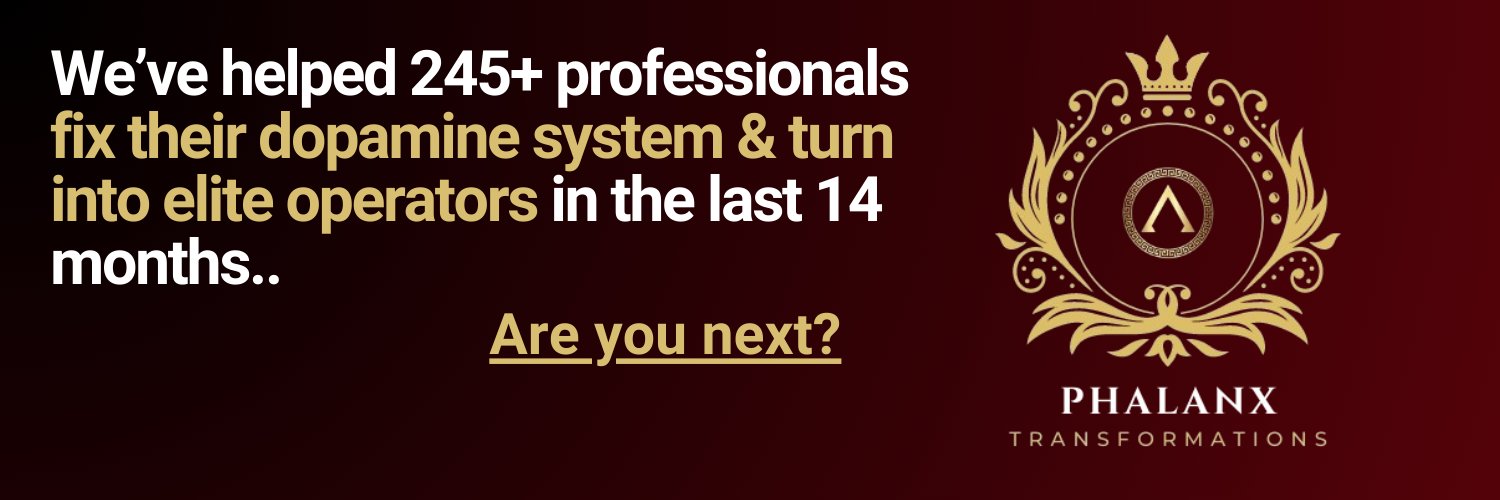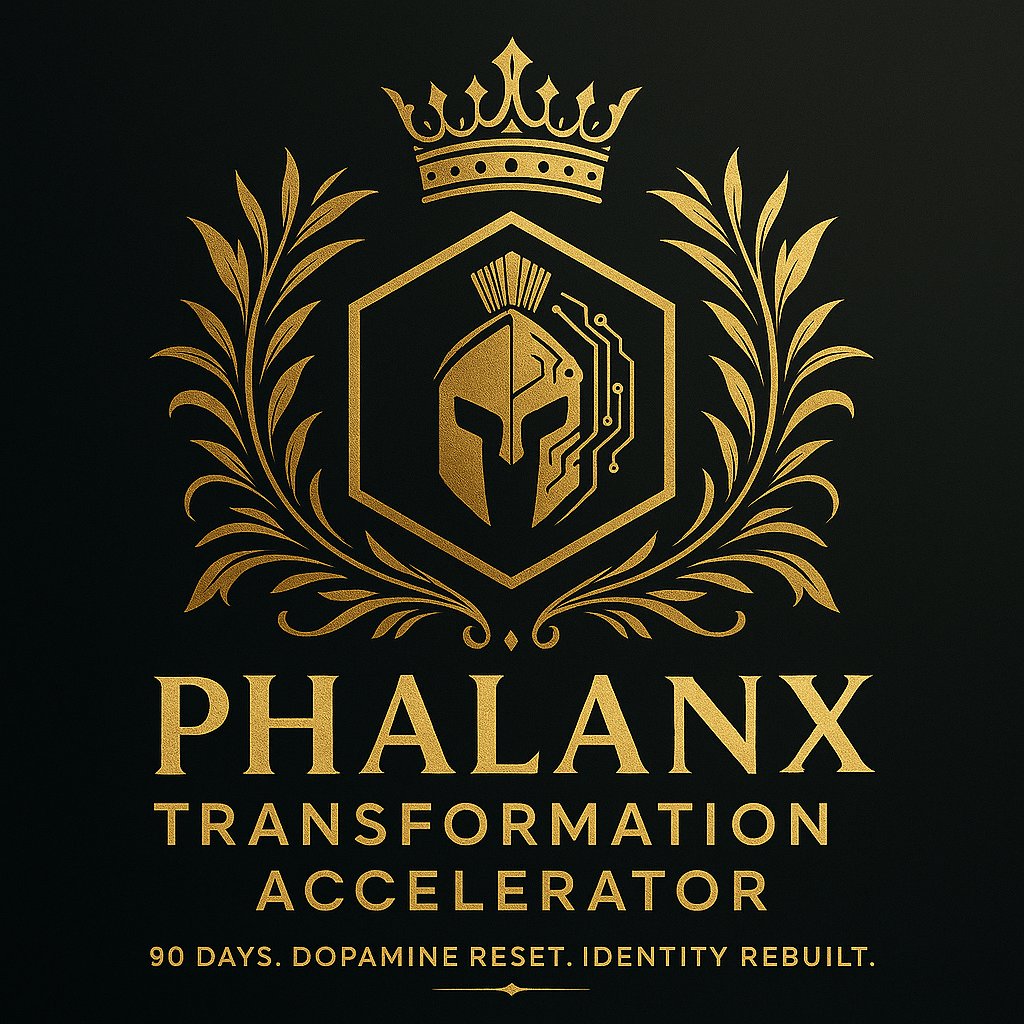
Spartan Psyche
@SpartanPsyche
Behavioral engineer. #1 Addiction & Dopamine rewiring program on Twitter. 250+ clients transformed. "No-one does it like Boys at the Phalanx" - Lee.
INTRODUCING – THE PHALANX TRANSFORMATION ACCELERATOR High performers, operators, professionals… If you're caught in a relentless loop, Fighting invisible battles daily, Relapsing repeatedly, Trapped in habits you despise, Yet can't seem to stop.. Feeling controlled by…

Recovery creates silence. Silence feels safe. But comfort is where old circuits wake back up, the scroll, the snack, the self-pity. You think you’re stable, but it’s just the craving sleeping. Never get soft. Peace without structure turns to relapse in disguise
The relapse starts long before the drug. You relapse when you stop sleeping. When you skip workouts. The drug is just the final step. Relapse is the collapse of your system. Rebuild the system daily. Recovery isn’t a decision. It’s architecture.
Your brain doesn’t understand right or wrong. It understands repetition. Your brain doesn’t judge, it just strengthens whatever you repeat. If you relapse 5 times, that’s a strong circuit. If you get clean for 6 weeks, that’s a stronger one. You’re not failing. You’re teaching.
The voice that says it’s over? That’s not you. That’s withdrawal. That’s fatigue. That’s the enemy negotiating. Don’t listen. You’re 30 clean days away from being unrecognizable. You just have to suffer without applause long enough to meet the real you.
Waiting to feel motivated is another form of relapse. Real change begins when you act in the absence of energy, approval, or pleasure. That first sober rep, that early alarm, that lonely lift; that’s identity forging. Stack it until it becomes instinct.
You don’t build self-respect by saying affirmations. You build it by suffering on purpose; in the gym, in the mirror, in silence, and knowing you didn’t flinch. That’s how confidence grows: from doing what weak men avoid. Pain isn’t the problem. Flinching is.
You don’t need a perfect month. You need one brutal, clear, locked-in day. One day where you say no to every excuse. One day where you show up like it’s life or death. That day resets something ancient in you. Stack that day. Then again. That’s how it begins.
People think rock bottom is death. It’s not. It’s the first honest sentence in your real story. It’s the moment you stop lying, stop running, stop negotiating. The collapse is the clean page. Now write something ruthless, disciplined, and undeniable.
You feel numb because your brain stopped rewarding shortcuts. That’s not burnout, it’s detox. Natural dopamine is tied to effort. Sleep. Lifting. Progress. The receptors are still there. They’re just waiting for a reason to light back up.
You won’t wake up one day and feel healed. You’ll wake up, do the same boring routine, and realize you haven’t thought about using in a week. That’s the real reward: boredom that doesn’t hurt. Peace that’s quiet. Dopamine earned, not hijacked.
Recovery feels dull not because you’re failing, but because your brain is learning to process reality without distortion. You used to feel artificial peaks. Now you're learning to feel baseline life. It’s not euphoric. It’s honest. Stay with it.
You got high in seconds. You recover in seasons. This isn’t punishment, it’s design. The brain takes time to rebuild trust in delayed reward. You’re rewiring circuits forged in crisis. Of course it feels slow. But what’s built slow doesn’t collapse under pressure
Addiction isn’t failure, it’s speed. Your brain found something that worked, lit up the reward circuit, and hardwired it through repetition. You didn’t fall behind. You adapted. Fast. Now you’re here to adapt again, slowly, brutally, consciously, permanently.
You stayed clean for 3 weeks. You meditated. You journaled. You felt okay. Then you slipped. Not because you’re weak, but because your neurons hadn’t built enough insulation yet. The wires sparked under stress. Keep repeating. Plasticity takes time.
The worst part of recovery isn’t the cravings. It’s the clarity. Cravings are physical. They pass. But clarity stays. It shows you the damage you did. The people you hurt. The time you burned. And there’s no chemical to blur it now. That weight? It’s your conscience waking up.
The substance gave you what life wouldn’t, predictability. No negotiation. No letdowns. Just control. But that control came at the cost of freedom. Now recovery feels unstable because the outcome isn’t guaranteed. Good. That means it’s real life again.
The drug gave you the illusion of progress. You felt creative. Social. Disciplined. But the dopamine wasn’t tied to action, it was synthetic. No output. Just signal. That’s why recovery feels empty: now you have to earn your neurotransmitters.
Addiction compresses time. Nothing exists but the next hit. Tomorrow doesn’t matter. Only now. Recovery stretches time back out. Days feel long. Moments feel heavy. That’s healing. Pain returns. So does presence. You’re not losing your mind. You’re regaining time.
Your brain will gaslight you during recovery. It’ll tell you it wasn’t that bad. That you’re fine now. That you can handle just one. That’s not truth. That’s the reward system reactivating memory + desire circuits. Don’t negotiate with it.
Cravings are old circuits trying to survive. That voice telling you to use? It’s not you. It’s old wiring screaming for oxygen. Every time you resist, you starve the circuit. Every sober choice is neuroplasticity in action. The brain is built to rewire.